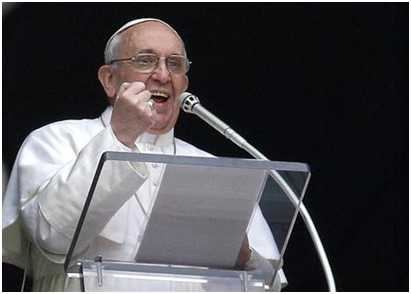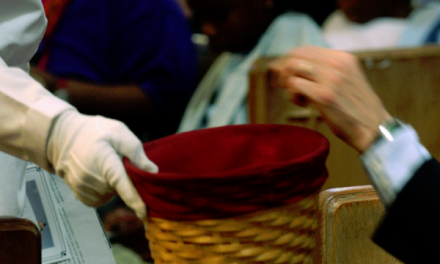November 14. World Day of the Poor. 2021. This day also sees the launch of a major initiative, the LAUDATO SI ACTION PLATFORM OF ACTION with seven goals to of ecological conversion. The second goal is responding to “The Cry of the Poor.” For more see www.laudatosiactionplatform.org. This goal connects with the message of Pope Francis for this day and a lengthy extract is provided here for reflection, sharing, action and prayer. Download the full message from www.vatican.va.
Extracts from Message of Pope Francis for World Day of the Poor 2021. 1. “The poor you will always have with you” (Mk 14:7). Jesus spoke these words at a meal in Bethany, in the home of Simon, the leper, shortly before Passover. The Evangelist recounts, a woman came in with an alabaster flask of precious ointment and poured it over Jesus’ head. This caused great amazement and gave rise to two different interpretations.
The first was indignation on the part of some of those present, including the disciples, who, considering the value of the ointment – about 300 denarii, equivalent to the annual salary of a labourer – thought it should have been sold and the proceeds given to the poor. Saint John notes that Judas said this not because he cared about the poor, but because he was a thief, and used to take from the money box. This shows, those who do not respect the poor betray Jesus’ teaching and cannot be his disciples.
The second interpretation was that of Jesus, and it makes us appreciate the profound meaning of the woman’s act. He says, “Let her alone. Why do you trouble her? She has done a beautiful thing to me” (Mk 14:6). Jesus knows that his death is approaching, and he sees in her act an anticipation of the anointing of his lifeless body prior to its placement in the tomb. This was beyond anything the others could imagine. Jesus was reminding them that he is the first of the poor, the poorest of the poor, because he represents all of them. It was also for the sake of the poor, the lonely, the marginalized and the victims of discrimination, that the Son of God accepted the woman’s gesture. She alone understood what the Lord was thinking. That nameless woman, representing women who down the centuries would be silenced and suffer violence, became the first who were at the supreme moments of Christ’s life: his crucifixion, death, burial and resurrection. Women, so often discriminated against play a leading role in the history of revelation. Jesus’ then associates her with the mission of evangelization: “Amen, I say to you, wherever the Gospel is proclaimed to the whole world, what she has done will be told in memory of her” (Mk 14:9).
2. The face of God revealed by Jesus is of a Father concerned for the poor. Jesus teaches that poverty is not the result of fate, but a concrete sign pointing to his presence among us. We do not find him when and where we want, but see him in the lives of the poor, their sufferings and needs and inhuman conditions in which they are forced to live. The poor are true evangelizers, they were the first to be evangelized and share in the Lord’s joy and his kingdom (cf. Mt 5:3).
The poor, always and everywhere, evangelize us, because they enable us to discover in new ways the true face of the Father. “They have much to teach us. They know the suffering Christ through their own sufferings. It is necessary that we all let ourselves be evangelized by them. We are called to discover Christ in them, to lend them our voice in their causes, but also to be their friends, to listen to them, to understand them and to welcome the mysterious wisdom that God wants to communicate to us through them. Our commitment does not consist exclusively of activities or programmes of promotion and assistance; what the Holy Spirit mobilizes is not an unruly activism, but an attentiveness that considers the other as one with ourselves and the beginning of a true concern for their person which inspires me effectively to seek their good” (Evangelii Gaudium, 198-199).
3. Jesus not only sides with the poor; he also shares their lot, a powerful lesson for his disciples in every age. This is the meaning of “the poor you will always have with you.” That should not make us indifferent, but summon us instead to a mutual sharing of life. The poor are not people “outside” our communities, but brothers and sisters whose sufferings we should share, in an effort to alleviate their difficulties and marginalization, restore their lost dignity and ensure their necessary social inclusion. Acts of charity presuppose a giver and a receiver, whereas mutual sharing generates fraternity. Almsgiving is occasional; mutual sharing, on the other hand, is enduring. The former risks gratifying those who perform it and can prove demeaning for those who receive it; the latter strengthens solidarity and lays the necessary foundations for justice. Believers, when they want to see Jesus in person and touch him with their hands, know where to turn. The poor are a sacrament of Christ.
5. Christ’s Gospel summons us to recognize the varied and excessive forms of moral and social disorder that are generating ever new forms of poverty. There seems to be a growing notion that the poor are not only responsible for their condition, but that they represent an intolerable burden for an economic system focused on the interests of a few privileged groups. A market that ignores ethical principles, or picks and chooses from among them, creates inhumane conditions for people already in precarious situations. We are seeing the creation of new traps of poverty and exclusion, set by unscrupulous economic and financial actors lacking in humanitarian sense and social responsibility.
Last year we experienced another scourge that multiplied the numbers of the poor: the pandemic, which continues to affect millions of people even when it does not bring suffering and death. The poor have increased disproportionately and, tragically, they will continue to do so in coming months. Some countries are suffering extremely severe consequences from the pandemic, and he most vulnerable of their people lack basic necessities. The long lines in front of soup kitchens are a tangible sign of this. There is a clear need to find the most suitable means of combating the virus at the global level without promoting partisan interests. It is especially urgent for those who are unemployed, who include many fathers, mothers, and young people. Social solidarity and the generosity which many, thanks be to God, have shown are, with far-sighted projects of human promotion, making a most important contribution. Serving the poor effectively moves us to action and makes it possible to find the most suitable ways of raising this part of humanity that all too often is anonymous and voiceless, but which has imprinted on it the face of the Saviour who asks for our help. 8. “The poor you will always have with you” (Mk 14:7). This is a summons never to lose sight of every opportunity to do good. Reflect, share, act and pray







Recent Comments